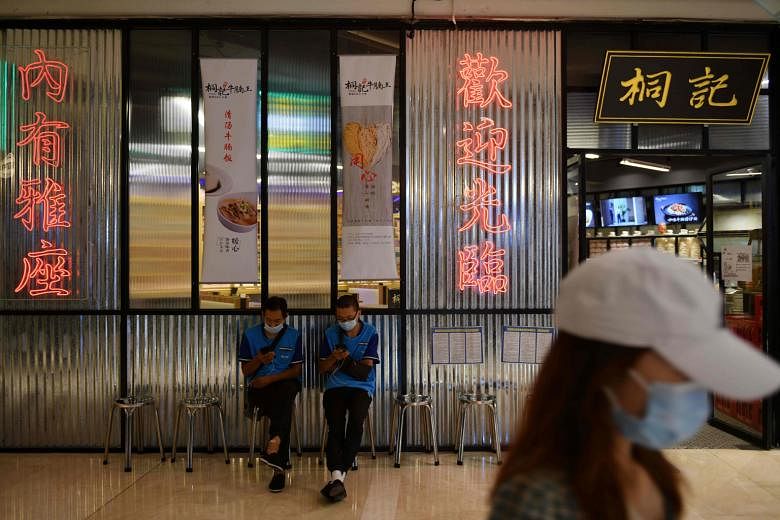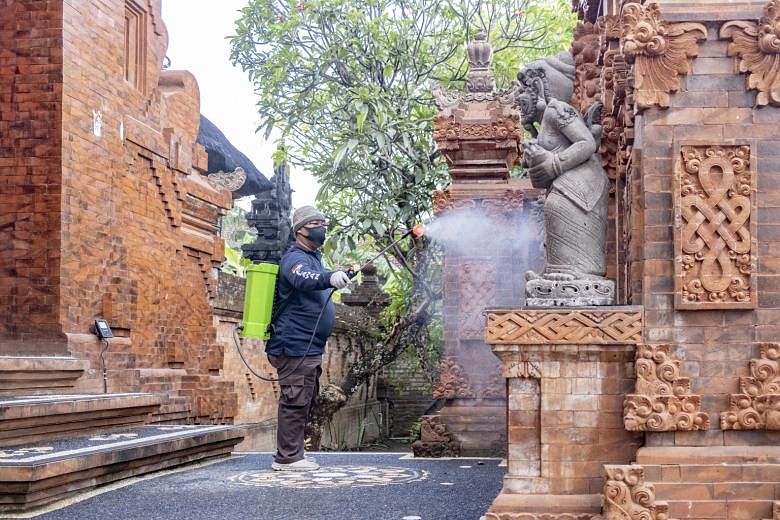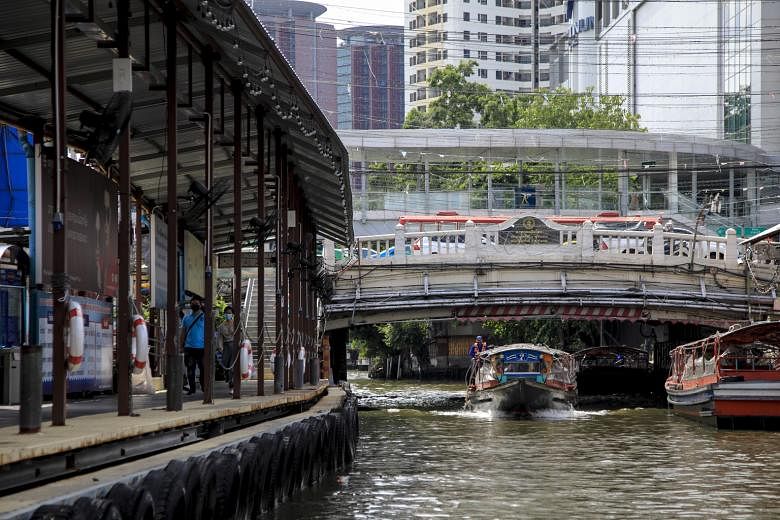CHINA
Cities and provinces across China have offered consumption coupons to encourage spending.
Wuhan, the original epicentre of the outbreak, began giving out vouchers in April as it came out of a two-month lockdown. As much as 500 million yuan (S$101 million) worth of vouchers were given out to be used in supermarkets, restaurants, malls and cultural sites.
Local governments have roped in e-commerce platforms such as WeChat, Alipay and Meituan to issue coupons worth billions of yuan that can be used for food delivery orders, movies, visiting tourist sites and buying consumer goods.
Earlier this month, the Commerce Ministry launched a month-long nationwide campaign to boost spending, covering 179 cities in 35 provinces. Just a week ago, Beijing, too, issued another round of coupons worth 150 million yuan for food delivery orders, with more than 70,000 merchants participating.
The capital city has been among the most active in issuing vouchers since June. But some people have complained that the vouchers usually come with a minimum spend, while others have criticised the reliance on digital vouchers, which leave out the poorest who are unable to access these coupons.
JAPAN
The Go To Travel campaign was rolled out on July 22 in all areas, except travel to and from Tokyo, to spur tourism within the country.
It offers up to a 35 per cent discount on domestic trips, up to 10,000 yen (S$130) per day trip, or up to 20,000 yen per person per night. This includes spending on transport and accommodation.
The government has earmarked 1.35 trillion yen for the discounts.
From Thursday, the campaign will be expanded to include Tokyo, and will offer up to a 50 per cent discount - with the government subsidising 35 per cent and the remaining 15 per cent covered by regional municipalities.
The campaign, which applies to residents of Japan including foreign residents but not short-term visitors, is expected to last six months.
While most people welcome the campaign, others worry about the consequences of increased consumption and domestic travel, given that the crisis is still evolving.
In fact, days after the campaign began, an explosion of cases in Aichi and Okinawa led the two prefectures to declare a state of emergency. But the government says the campaign is a success: Between July 22 and Aug 31, 13.39 million people took advantage of the campaign to stay at hotels, but "just" 11 of them ended up contracting Covid-19.
SOUTH KOREA
In July, the government announced it was giving out eight types of coupons to boost consumption and revitalise South Korea's regional economies. The coupons offer discounts and cashbacks in sectors including domestic tourism, food and beverage, and sports.
The government is spending US$140 million (S$193 million) on the coupons - distributed since last month - and expects it will lead to about US$837 million in spending, reported Arirang News.
But the discount coupons for domestic travel were suspended last month due to new Covid-19 clusters in the greater Seoul region, Yonhap News Agency reported.
In May, a national disaster relief fund was launched, with 400,000 won (S$470) to one million won distributed to each household, depending on the number of members.
The sum was given out in credit or debit card points, or pre-paid cards or gift certificates for use at small businesses.
Regional governments, including Seoul, Gyeonggi and Daegu, have also doled out their own relief funds. In April, Daegu - the city worst hit by the pandemic - disbursed between 500,000 won and 900,000 won to about 450,000 households that earned less than the median income.
Engineer Will Sung, 43, who has a two-year-old daughter, has received 1.2 million won in subsidies. The money was mostly spent on groceries and food, as well as a haircut and dental treatment.
"It's really good the government is taking care of us... But I hope the government will not overspend and will keep enough money in the reserves, because the fight against coronavirus is a long-term battle," he said.
TAIWAN
On July 15, the government launched a NT$50 billion (S$2.4 billion) cash voucher programme. The vouchers can be used to purchase a wide range of goods and services.
Taiwanese and foreign spouses with permanent residency can each pay NT$1,000 for NT$3,000 worth of vouchers that are valid until the end of the year. The payment is waived for low-income or disadvantaged households.
At least 21.5 million sets of vouchers have been purchased, with those eligible limited to one set each. Taiwan has a population of 23.8 million.
The vouchers cannot be used to pay credit card bills, taxes or traffic tickets, or buy stocks and cigarette products, among others.
Beautician Ou You-ning, 32, used her husband's and daughter's vouchers to buy an iPad.
Some people are also buying the vouchers to use at small businesses.
MALAYSIA
Malaysians aged 18 and above with an annual income below RM100,000 (S$33,000) each received RM50 in e-wallet credit under the e-Penjana programme.
The credit is for groceries, fuel and utilities, among other things, to be spent by Wednesday. Successful e-Penjana claimants would also get matching vouchers, discounts or cashback from e-wallet operators, worth at least RM50.
A total of RM750 million has been earmarked for e-Penjana.
Ms Carina Li, 34, who works for a property developer, said the e-wallet top-up did spur her to spend a little more on e-commerce sites during the Sept 9 online sales.
INDONESIA
From Aug 27, the government began disbursing 2.4 million rupiah (S$220) in cash aid through bank transfers to workers. Some 15.7 million workers with a monthly salary below five million rupiah will receive the cash, spread over four months.
Manpower Minister Ida Fauziyah told The Jakarta Post: "The cash aid is expected to maintain people's purchasing power and boost spending so that it would have a multiplier effect on economic growth."
The government is also offering free tours and staycations to 4,440 Bali residents, in a seven-week promotion starting from Oct 7.
The initiative aims to boost the popular holiday destination which has been devastated by the pandemic, and will also test Bali's coronavirus health protocols.
THAILAND
A tourism campaign called We Travel Together was launched on July 18 and will run till December.
The 22.4 billion baht (S$977 million) campaign offers a 40 per cent discount on hotel rooms and restaurants. Those who travel by air will also get a 40 per cent refund on airfare when they complete their trip, The Nation newspaper reported.
The campaign is open to Thai nationals aged 18 and above, and they must travel, stay and dine in a province other than the one in which they are registered to live, according to The Bangkok Post.
As at Sept 5, the scheme has chalked up hotel room bookings of just 2.5 billion baht, said the Tourism Authority of Thailand. The most popular destinations included Chon Buri, Phuket and Bangkok.
Thailand also plans to distribute 3,000 baht to 10 million people for use in small purchases, through an app developed by state-owned Krungthai Bank. Thais aged 18 and above can apply for the scheme when it is launched next month.
The government will pay for half of the cost of items bought and limit use to 100 baht per day, so that the stimulus will benefit small and medium-sized enterprises.
The Covid-19 pandemic has crippled many economies around the world, with consumption plunging as a result of lockdowns and social distancing measures to contain the spread of the coronavirus.
Governments have rolled out coupons and vouchers, subsidies and discounts, and even given out cash to encourage spending in sectors hit hard by the crisis, such as domestic tourism, food and beverage, retail and entertainment.
While most people welcome the help, others are concerned that such initiatives may lead to a resurgence of Covid-19 cases as more people shop and dine or travel.
The Straits Times correspondents Tan Dawn Wei, Walter Sim, Chang May Choon, Katherine Wei, Shannon Teoh, Arlina Arshad and Tan Hui Yee look at the various financial programmes governments have launched to lift their economies.



